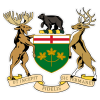It's coming...
Health Protection and Promotion Act
R.S.O. 1990, CHAPTER H.7
Last amendment: 2020, c. 13, Sched. 3, s. 4.
PART I
INTERPRETATION
PART II
HEALTH PROGRAMS AND SERVICES
PART III
COMMUNITY HEALTH PROTECTION
PART IV
COMMUNICABLE DISEASES
Definitions, Part IV
21 (1) In this Part,
“institution” means,
- Repealed: 2007, c. 8, s. 210.
- premises that had been approved under subsection 9 (1) of Part I (Flexible Services) of the Child and Family Services Act, as it read before its repeal,
- “children’s residence” within the meaning of Part IX (Residential Licensing) of the Child, Youth and Family Services Act, 2017,
- “child care centre” within the meaning of the Child Care and Early Years Act, 2014,
- “supported group living residence” within the meaning of the Services and Supports to Promote the Social Inclusion of Persons with Developmental Disabilities Act, 2008;
- “intensive support residence” within the meaning of the Services and Supports to Promote the Social Inclusion of Persons with Developmental Disabilities Act, 2008;
- “home for special care” within the meaning of the Homes for Special Care Act,
- “long-term care home” within the meaning of the Long-Term Care Homes Act, 2007,
- “psychiatric facility” within the meaning of the Mental Health Act,
- Repealed: 2009, c. 33, Sched. 18, s. 12 (2).
- “correctional institution” within the meaning of the Ministry of Correctional Services Act,
Note: On a day to be named by proclamation of the Lieutenant Governor, clause (k) of the definition of “institution” in subsection 21 (1) of the Act is amended by striking out “Ministry of Correctional Services Act” at the end and substituting “Correctional Services and Reintegration Act, 2018”. (See: 2018, c. 6, Sched. 3, s. 10 (1)) - “detention facility” within the meaning of section 16.1 of the Police Services Act,
Note: On a day to be named by proclamation of the Lieutenant Governor, clause (l) of the definition of “institution” in subsection 21 (1) of the Act is repealed. (See: 2019, c. 1, Sched. 4, s. 22 (1)) - Repealed: 2007, c. 8, s. 210.
- “private hospital” within the meaning of the Private Hospitals Act,
Note: On a day to be named by proclamation of the Lieutenant Governor, clause (n) of the definition of “institution” in subsection 21 (1) of the Act is repealed and the following substituted: (See: 2017, c. 25, Sched. 9, s. 98 (1))
a community health facility within the meaning of the Oversight of Health Facilities and Devices Act, 2017 that was formerly licensed under the Private Hospitals Act, - place or facility designated as a place of secure custody under section 24.1 of the Young Offenders Act (Canada), whether in accordance with section 88 of the Youth Criminal Justice Act (Canada) or otherwise,
- a prescribed place,
and includes any other place of a similar nature; (“établissement”)
“superintendent” means the person who has for the time being the direct and actual superintendence and charge of an institution. (“chef d’établissement”) R.S.O. 1990, c. H.7, s. 21 (1); 2001, c. 13, s. 17; 2002, c. 17, Sched. F, Table; 2006, c. 19, Sched. D, s. 8 (1); 2007, c. 8, s. 210; 2007, c. 10, Sched. F, s. 2; 2008, c. 14, s. 53; 2009, c. 33, Sched. 8, s. 13; 2009, c. 33, Sched. 18, s. 12 (2).; 2014, c. 11, Sched. 6, s. 3; 2017, c. 14, Sched. 4, s. 17 (1).
Idem
(2) In this Part,
“administrator”, “hospital”, “out-patient” and “patient” have the same meanings as in the Public Hospitals Act. R.S.O. 1990, c. H.7, s. 21 (2).
Order by M.O.H. re communicable disease
22 (1) A medical officer of health, in the circumstances mentioned in subsection (2), by a written order may require a person to take or to refrain from taking any action that is specified in the order in respect of a communicable disease. R.S.O. 1990, c. H.7, s. 22 (1).
Condition precedent to order
(2) A medical officer of health may make an order under this section where he or she is of the opinion, upon reasonable and probable grounds,
- that a communicable disease exists or may exist or that there is an immediate risk of an outbreak of a communicable disease in the health unit served by the medical officer of health;
- that the communicable disease presents a risk to the health of persons in the health unit served by the medical officer of health; and
- that the requirements specified in the order are necessary in order to decrease or eliminate the risk to health presented by the communicable disease. R.S.O. 1990, c. H.7, s. 22 (2); 1997, c. 30, Sched. D, s. 3 (1).
Time
(3) In an order under this section, a medical officer of health may specify the time or times when or the period or periods of time within which the person to whom the order is directed must comply with the order. R.S.O. 1990, c. H.7, s. 22 (3).
What may be included in order
(4) An order under this section may include, but is not limited to,
- requiring the owner or occupier of premises to close the premises or a specific part of the premises;
- requiring the placarding of premises to give notice of an order requiring the closing of the premises;
- requiring any person that the order states has or may have a communicable disease or is or may be infected with an agent of a communicable disease to isolate himself or herself and remain in isolation from other persons;
- requiring the cleaning or disinfecting, or both, of the premises or the thing specified in the order;
- requiring the destruction of the matter or thing specified in the order;
- requiring the person to whom the order is directed to submit to an examination by a physician and to deliver to the medical officer of health a report by the physician as to whether or not the person has a communicable disease or is or is not infected with an agent of a communicable disease;
- requiring the person to whom the order is directed in respect of a communicable disease that is a virulent disease to place himself or herself forthwith under the care and treatment of a physician;
- requiring the person to whom the order is directed to conduct himself or herself in such a manner as not to expose another person to infection. R.S.O. 1990, c. H.7, s. 22 (4); 1997, c. 30, Sched. D, s. 3 (2).
Person directed
(5) An order under this section may be directed to a person,
- who resides or is present;
- who owns or is the occupier of any premises;
- who owns or is in charge of any thing; or
- who is engaged in or administers an enterprise or activity,
in the health unit served by the medical officer of health. R.S.O. 1990, c. H.7, s. 22 (5).
Class orders
(5.0.1) An order under this section may be directed to a class of persons who reside or are present in the health unit served by the medical officer of health. 2003, c. 1, s. 15 (1).
Notice to class
(5.0.2) If a class of persons is the subject of an order under subsection (5.0.1), notice of the order shall be delivered to each member of the class where it is practicable to do so in a reasonable amount of time. 2003, c. 1, s. 15 (1).
Same, general notice
(5.0.3) If delivery of the notice to each member of a class of persons is likely to cause a delay that could, in the opinion of the medical officer of health, significantly increase the risk to the health of any person, the medical officer of health may deliver a general notice to the class through any communications media that seem appropriate to him or her, and he or she shall post the order at an address or at addresses that is or are most likely to bring the notice to the attention of the members of the class. 2003, c. 1, s. 15 (1).
Information in notice
(5.0.4) A notice under subsection (5.0.3) shall contain sufficient information to allow members of the class to understand to whom the order is directed, the terms of the order, and where to direct inquiries. 2003, c. 1, s. 15 (1).
Hearing for class member
(5.0.5) Where a class of persons is the subject of an order under subsection (5.0.1), any member of the class may apply to the Board for the purposes of requiring a hearing under section 44 respecting that member. 2003, c. 1, s. 15 (1).
Health Care Consent Act, 1996
(5.1) The Health Care Consent Act, 1996 does not apply to,
- a physician’s examination of a person pursuant to an order under this section requiring the person to submit to an examination by a physician;
- a physician’s care and treatment of a person pursuant to an order under this section requiring the person to place himself or herself under the care and treatment of a physician. 1996, c. 2, s. 67 (1).
Additional contents of order
(6) In an order under this section, a medical officer of health,
- may specify that a report will not be accepted as complying with the order unless it is a report by a physician specified or approved by the medical officer of health;
- may specify the period of time within which the report mentioned in this subsection must be delivered to the medical officer of health. R.S.O. 1990, c. H.7, s. 22 (6).
Reasons for order
(7) An order under this section is not effective unless the reasons for the order are set out in the order. R.S.O. 1990, c. H.7, s. 22 (7).
22.1 Repealed: 2006, c. 26, s. 15 (1).
Order by M.O.H. re person under sixteen
23 Where an order by a medical officer of health in respect of a communicable disease is directed to a person under sixteen years of age and is served upon the parent of the person or upon any other person who has the responsibilities of a parent in relation to the person under sixteen years of age, the parent or other person shall ensure that the order is complied with. R.S.O. 1990, c. H.7, s. 23.
Directions by M.O.H.
24 (1) A medical officer of health, in the circumstances specified in subsection (2), may give directions in accordance with subsection (3) to the persons whose services are engaged by or to agents of the board of health of the health unit served by the medical officer of health. R.S.O. 1990, c. H.7, s. 24 (1).
When M.O.H. may give directions
(2) A medical officer of health may give directions in accordance with subsection (3) where the medical officer of health is of the opinion, upon reasonable and probable grounds, that a communicable disease exists in the health unit and the person to whom an order is or would be directed under section 22,
- has refused to or is not complying with the order;
- is not likely to comply with the order promptly;
- cannot be readily identified or located and as a result the order would not be carried out promptly; or
- requests the assistance of the medical officer of health in eliminating or decreasing the risk to health presented by the communicable disease. R.S.O. 1990, c. H.7, s. 24 (2); 1997, c. 30, Sched. D, s. 4 (1).
Contents of directions
(3) Under this section, a medical officer of health may direct the persons whose services are engaged by or who are the agents of the board of health of the health unit served by the medical officer of health to take such action as is specified in the directions in respect of eliminating or decreasing the risk to health presented by the communicable disease. R.S.O. 1990, c. H.7, s. 24 (3); 1997, c. 30, Sched. D, s. 4 (2).
Idem
(4) Directions under this section may include, but are not limited to,
- authorizing and requiring the placarding of premises specified in the directions to give notice of the existence of a communicable disease or of an order made under this Act, or both;
- requiring the cleaning or disinfecting, or both, of any thing or any premises specified in the directions;
- requiring the destruction of any thing specified in the directions. R.S.O. 1990, c. H.7, s. 24 (4).
Recovery of expenses
(5) The expenses incurred by a board of health in carrying out directions given by a medical officer of health in respect of a communicable disease may be recovered with costs by the board of health from the person to whom an order is or would be directed under section 22 in respect of the communicable disease by action in a court of competent jurisdiction. R.S.O. 1990, c. H.7, s. 24 (5).
Duty to report disease
25 (1) A physician or a practitioner as defined in subsection (2) who, while providing professional services to a person who is not a patient in or an out-patient of a hospital, forms the opinion that the person has or may have a disease of public health significance shall, as soon as possible after forming the opinion, report thereon to the medical officer of health of the health unit in which the professional services are provided. R.S.O. 1990, c. H.7, s. 25; 1998, c. 18, Sched. G, s. 55 (2); 2017, c. 25, Sched. 3, s. 1 (3).
Definition
(2) In subsection (1),
“practitioner” means,
- a member of the College of Chiropractors of Ontario,
- a member of the Royal College of Dental Surgeons of Ontario,
- a member of the College of Nurses of Ontario,
- a member of the Ontario College of Pharmacists,
- a member of the College of Optometrists of Ontario,
- a member of the College of Naturopaths of Ontario,
- a prescribed person. 1998, c. 18, Sched. G, s. 55 (3); 2007, c. 10, Sched. F, s. 3; 2007, c. 10, Sched. P, s. 17.
Carrier of disease
26 A physician or registered nurse in the extended class who, while providing professional services to a person, forms the opinion that the person is or may be infected with an agent of a communicable disease shall, as soon as possible after forming the opinion, report thereon to the medical officer of health of the health unit in which the professional services are provided. R.S.O. 1990, c. H.7, s. 26; 2007, c. 10, Sched. F, s. 4.
Duty of hospital administrator to report re disease
27 (1) The administrator of a hospital shall report to the medical officer of health of the health unit in which the hospital is located if an entry in the records of the hospital in respect of a patient in or an out-patient of the hospital states that the patient or out-patient has or may have a disease of public health significance or is or may be infected with an agent of a communicable disease. R.S.O. 1990, c. H.7, s. 27 (1); 2017, c. 25, Sched. 3, s. 1 (3).
Duty of superintendent of institution to report re disease
(2) The superintendent of an institution shall report to the medical officer of health of the health unit in which the institution is located if an entry in the records of the institution in respect of a person lodged in the institution states that the person has or may have a disease of public health significance or is or may be infected with an agent of a communicable disease. R.S.O. 1990, c. H.7, s. 27 (2); 2017, c. 25, Sched. 3, s. 1 (3).
When report to be given
(3) The administrator or the superintendent shall report to the medical officer of health as soon as possible after the entry is made in the records of the hospital or institution, as the case may be. R.S.O. 1990, c. H.7, s. 27 (3).
Duty of school principal to report disease
28 The principal of a school who is of the opinion that a pupil in the school has or may have a communicable disease shall, as soon as possible after forming the opinion, report thereon to the medical officer of health of the health unit in which the school is located. R.S.O. 1990, c. H.7, s. 28.







Comments